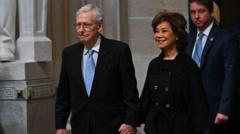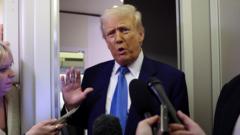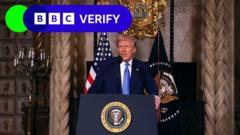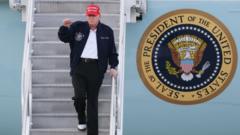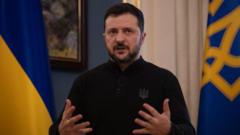The increasing isolation of Ukraine from diplomatic discussions regarding its future has prompted urgent gatherings among European leaders, who are uniting in response to the possibility of a U.S.-Russia agreement that could drastically alter the geopolitical landscape.
Ukraine’s Exclusion from Peace Talks Sparks European Alarm

Ukraine’s Exclusion from Peace Talks Sparks European Alarm
European leaders seek to forge a united front as U.S.-Russia negotiations proceed without Ukraine’s input, heightening regional tensions.
In a bid to navigate the diplomatic impasse, international tensions have surged as President Trump’s upcoming negotiations with Russia appear to sideline both Ukraine and critical European players. The urgency of the situation has led to an emergency meeting convened in Paris as British Prime Minister Keir Starmer expresses the need for British military involvement to ensure Ukraine’s safety against potential Russian encroachments.
President Zelensky has voiced strong objections to any peace arrangement between the U.S. and Russia that does not include Ukrainian representatives, emphasizing that Ukraine would never accept an agreement that does not prioritize its sovereignty. The reaction in Europe underscores fears that a potential deal could empower Russia's expansionist aspirations and jeopardize NATO's stability.
Vice President JD Vance and Defense Secretary Pete Hegseth's remarks have further raised alarms over a possible shift in U.S. foreign policy towards a more conciliatory stance with Russia. Analysts contend that this approach could facilitate a significant strategic victory for Putin, undermining decades of NATO cohesion.
While Europe grapples with the implications of a potentially transformative U.S.-Russia agreement, critics have begun to analyze how Trump's administration’s approach might reflect a retrograde move in foreign affairs that could invite severe backlash. In addition, British leaders are advocating for proactive measures to guarantee Ukraine’s defense, revealing a stark divide in transatlantic strategies for addressing the crisis.
Zelensky’s staunch refusal to cede any resources in negotiations has only added to the tension as political leaders from various factions scrutinize the implications of the U.S.'s actions and rhetoric on their future alliances.
Overall, the intricacies of these unfolding events reveal a precarious balance between ambition and caution on both sides of the Atlantic, as European leaders brace themselves for the potential fallout of negotiations occurring without their input.
President Zelensky has voiced strong objections to any peace arrangement between the U.S. and Russia that does not include Ukrainian representatives, emphasizing that Ukraine would never accept an agreement that does not prioritize its sovereignty. The reaction in Europe underscores fears that a potential deal could empower Russia's expansionist aspirations and jeopardize NATO's stability.
Vice President JD Vance and Defense Secretary Pete Hegseth's remarks have further raised alarms over a possible shift in U.S. foreign policy towards a more conciliatory stance with Russia. Analysts contend that this approach could facilitate a significant strategic victory for Putin, undermining decades of NATO cohesion.
While Europe grapples with the implications of a potentially transformative U.S.-Russia agreement, critics have begun to analyze how Trump's administration’s approach might reflect a retrograde move in foreign affairs that could invite severe backlash. In addition, British leaders are advocating for proactive measures to guarantee Ukraine’s defense, revealing a stark divide in transatlantic strategies for addressing the crisis.
Zelensky’s staunch refusal to cede any resources in negotiations has only added to the tension as political leaders from various factions scrutinize the implications of the U.S.'s actions and rhetoric on their future alliances.
Overall, the intricacies of these unfolding events reveal a precarious balance between ambition and caution on both sides of the Atlantic, as European leaders brace themselves for the potential fallout of negotiations occurring without their input.


